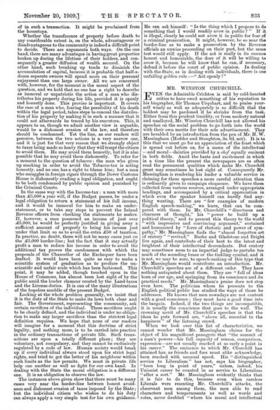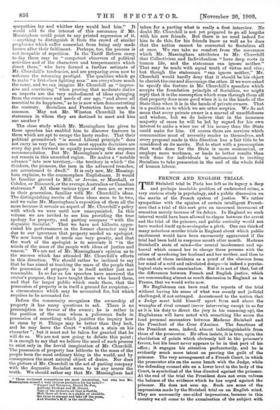MR. WrNSTON CHTTRCHILL.
EVEN the Admirable Crichton is said, by cold-hearted critics to have owed something of his reputation to his biographer, Sir Thomas Urquhart, and. to praise your- self wisely as well as adequately is so difficult that the boldest may be pardoned if he shrinks from the task. Either from this prudent timidity, or from modesty natural and unalloyed, Mr. Winston Churchill has not allowed his speeches on the social problem to go forth into the world with their own merits for their sole advertisement. They are heralded by an introduction from the pen of Mr. H. W. Massingham (Hodder and Stoughton, 3s. 6d. net). It is to this that we must go for an appreciation of the feast which is spread out before us, for a menu of the intellectual —and moral—dainties provided by a del' equally eminent in both fields. Amid the haste and excitement in which in a time like the present the newspapers are so often read the permanent qualities which make Mr. Churchill great may sometimes be lost sight of. Consequently Mr. Massingham is rendering his leader a valuable service in claiming for these speeches a more careful attention than is ordinarily given to campaign eloquence. We have them collected from various sources, arranged under appropriate headings, and accompanied by a critical appreciation in which even the speaker himself can hardly find any- thing wanting. There are "few examples of modern English speech-making," we learn, that can be com- pared with them. In Mr. Churchill's "directness and clearness of thought," his "power to build up a political theory," and to present this theory to the world "with impressive and convincing argument," sustained and humanised by " force of rhetoric and power of sym- pathy," Mr. Massingham finds the "almost forgotten art of oratory" "revived." Burke and Gladstone and Bright live again, and contribute of their best to the latest and brightest of their intellectual descendants. But oratory may sometimes seem to an impartial judge to partake too much of the sounding brass or the tinkling cymbal, and it is not, we may be sure, to speech-making of this type that Mr. Massingham would contribute an introduction. Mr. Churchill's speeches are of a different order. They have nothing antiquated. about them. They are "full of ideas born of our age, and springing from its conscience and its practical needs." Mr. Massingham's praise does not stop even here. The politician whom he presents to the English political public has studied the ways of those he addresses. He knows that men nowadays are not content with a good conscience ; they must have a good time into the bargain. Indeed, if the two things are incompatible, it is usually the conscience that goes to the wall. The crowning merit of Mr. Churchill's speeches is that the ideas he puts forward are, "above all, essential to the happiness" of the listening crowd.
When we look over this list of characteristics, we cannot wonder that Mr. Massingham claims for the object of his magnificent panegyric that "the summit of a man's powers—his full capacity of reason, comparison, expression—are not usually reached at so early a point in his career." The eminence to which Mr. Churchill has attained has, as friends and foes must alike acknowledge, been reached. with unusual speed. His "distinguished service to Liberalism" has not, says his biographer, "been long in point of years," unless, indeed, his Unionist career be counted in as service to Liberalism "after a sort." Mr. Massingham evidently thinks that it is fair to do this, because even when careless Liberals were resenting Mr. Churchill's attacks, the observant men among them, the men able to read characters and temperaments as well as words and sympathies lay and whither they would lead him." It would add to the interest of this assurance if Mr. Massingham could point to any printed expression of it, —anything to distinguish it from the crowd of similar prophecies which suffer somewhat from being only made known after their fulfilment. Perhaps, too, the process is not incapable of repetition. In the Tariff Reform camp to-day there may be "competent observers of political activities and of the characters and temperaments which direct them," who have formed a further estimate of Mr. Churchill's tendencies, and are preparing even now to welcome the returning prodigal. The qualities which go to make "a first-class fighting man" are everywhere much the same, and we can imagine Mr. Churchill as "impres- sive and convincing" when proving that moderate duties on imports are the very embodiment of ideas springing from the conscience and needs of our age, "and above all essential to its happiness," as he is now when demonstrating the contrary. Socialism and Protection have much in common. May not Mr. Winston Churchill be the statesman in whom they are destined to meet and kiss one another ?
The close study which Mr. Massingham has given to these speeches has enabled him to discover features in them which are apt to escape the hasty reader. That their political groundwork "is sound Liberal principle" does not carry us very far, since the most opposite doctrines are every day put forward as equally possessing this supreme recommendation. But Mr. Massmgham's new star does not remain in this unsettled region. He makes a "notable advance" into new territory,—the territory in which "the thinkers, the pioneers, the men in the advanced trenches, are accustomed to dwell." It is only new, Mr. Massing- ham explains, to the commonplace Englishman. It would be familiar ground to Mill, or Jevons, or Marshall, or Cobden, or Bismarck, or the average Australian or Canadian statesman.* All these various types of men are, or were in their generation, familiar with Mr. Churchill's ideas. The distinguishing merits of these ideas seem to be two, and we value Mr. Massingham's exposition of them all the more because it reveals an aspect of Mr. Churchill's policy with which we were until now unacquainted. In this volume we are invited to see him providing the true apology for property, and parting company "with the dogmatic Socialist." That we have not hitherto appre- ciated his performances in the former character may be due to our ignorance that property needed an apologist. We now learn that it needs one very greatly, and that the work of the apologist is to associate it "in the minds of the mass of the people with ideas of justice and reason." We are not of Mr. Massinghanis opinion as to the success which has attended Mr. Churchill's efforts in this direction. We should rather be inclined to say that he has aimed at teaching the Mass of the people that the possession of property is in itself neither just nor reasonable. In so far as his speeches have answered the orator's purpose, they have taught those who heard them, and that far larger public which reads them, that the possession of property is in itself a ground for suspicion,— a circumstance which may be accounted for, but which requires to be accounted for.
Before the community recognises the ownership of property it has many questions to ask. There is no presumption in favour of the owner; he is rather in the position of the man whom a policeman finds in possession of something which justifies the inquiry how he came by it. Things may be better than they look, and he may leave the Court "without a stain on his character "; but it must not be taken for granted that he will do so. We are not now going to debate this point; it is enough to say that we believe the need of such process to exist only in the fervid imagination of Mr. Churchill. The possession of property has hitherto to the mass of the people been the most ordinary thi g in the world, and by consequence the most natural object of desire. Nor does the picture of Mr. Churchill in the act of parting company with the dogmatic Socialist seem to us any nearer the truth. We should rather say that Mr. Massingham had
• These continued comparisons are most interesting, but why has Mr. Musinghana missed a very obvious quotation for his hero?— . Tupper and Tennyson, Daniel De Foe, Anthony Trollope and M. Guizot Take of the elements all that is fusible, Melt them all down in a pipkin or crucible. Set them to simmer and take off the scum, And Dundee's M.P. is the residuum."
taken for a parting what is really a first interview. No doubt Mr. Churchill is not yet prepared to go all lengths with his new friends. But there is no need indeed for him to do this, for his friends know as well as he does that the nation cannot be converted to Socialism all at once. We can take no comfort from the assurance which Mr. Massingham attributes to Mr. Churchill that Collectivism and Individualism "have deep roots in human life, and the statesman can ignore neither." That may be made with equal truth of virtue and vice ; but though the statesman "can ignore neither," Mr. Churchill would hardly deny that it should be his object to cherish the one and discourage the other. If we were asked to specify the feature in Mr. Churchill's speeches which accepts the foundation principle of Socialism, we might reply that it is the assumption which runs through them all that property does more good when it is in the hands of the State than when it is in the hands of private owners. That is a position as to which we are utter sceptics. We do not mean that every private owner is a marvel of unselfishness and wisdom, but we do believe that in the immense majority of cases he will be led by regard for his own interest to make a wiser use of his money than the State could make for him. Of course there are services which communities must of necessity render to themselves, and every proposal made in this direction has a fair title to be considered on its merits. But to start with a presumption that work done for the State is more economical, or employs more workmen, or leads to better results than work done for individuals is tantamount to inviting Socialism to take possession in the end of the whole field of human labour.

























































 Previous page
Previous page